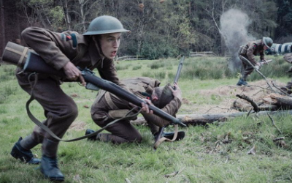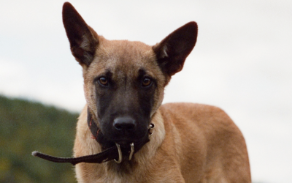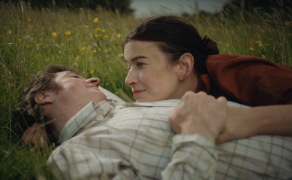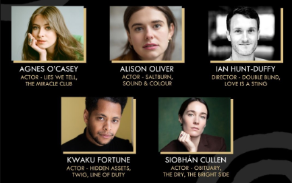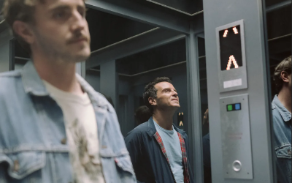To mark the 21st anniversary of the IFTA awards, we are showcasing Irish talent who are blazing a trail across our industry, working in front of and behind the camera.
Hosted in association with IFTA, this Q&A Series connects with Irish talent who represent a range of disciplines across our industry.
We find out about their approach to craft, working on the projects they’ve been nominated for, and the best piece of advice they’ve been given in their career.
John Walters is IFTA-nominated for Best Editing for The Last Rifleman. This is Walters’ first IFTA nomination. His recent editing credits include Black ‘47, It Is In Us All, and The Sparrow.
IFTN: Tell me about your experience working on this project, and your collaboration with the director.
JOHN: “I got in touch with The Last Rifleman director Terry Loane through a recommendation from a mutual friend. From our first conversation, Terry’s passion for the character of Artie Crawford and his commitment to honouring the legacy of the Northern Irish World War Two veterans was completely evident.”
“Terry and I worked very closely throughout the edit, often meeting at weekends during the shoot to review footage and make plans for the coming week’s filming. On one level, The Last Rifleman is structured as a road movie, tracking Artie’s journey from a retirement home in Lagan Valley to the beaches of Normandy, and it was shot linearly for the most part, so before each major location move we had to be certain that we had everything we needed to tell the story, as turning back to pick up shots was often extremely difficult logistically.”
IFTN: How do you approach each new project, and what is your process?
JOHN: “One of the trickiest things for me when starting a new project is shaking off the experience of making the previous one. As an editor, you spend so much time being absorbed in the tiny details of a film, its internal rhythms and the intricacies of its characters, that I always find it takes a few weeks to leave the old project behind and tune into the rhythms of the current one, particularly if they are in very different genres.”
“The Last Rifleman came on the heels of me finishing the edit on an American action movie, so it was quite a change of pace, but one thing that helps me immensely early on in my process is an old fashioned notebook and pen. I’ll often hand-write notes about footage after I’ve reviewed it: how it made me feel, what was or wasn’t working, et cetera. I don’t always refer back to the notes, but I find that the act of writing is a very useful way to process ideas and help get to the core of what a scene is about.”
IFTN: Simple changes to the edit can completely change how an audience responds to a scene. How would you describe the editor's role in terms of storytelling?
JOHN: “I think the role of an editor in a film’s storytelling is much like that of a narrator in a novel. You direct the audience’s attention, trying to help them absorb certain things whilst ignoring others, allowing them enough information to understand what’s going on, and ensuring that they never get too confused or start to think that the story is about you in any way. The characters are what matters most, not the technique, and a good editor should get themselves out of a good character’s way as often as possible.”
IFTN: How do you maintain tone and pacing throughout an edit?
JOHN: “Most of the tonal control in the film came through Terry’s direction and Pierce Brosnan’s performance. The film straddles emotional drama, comedy and even some action over its runtime, but the key to handling these tonal shifts editorially came through the use of effective scene transitions. Sometimes we transitioned location, sometimes we transitioned time periods, but Terry and I worked very hard to ensure that these shifts were never jarring and that they always followed through emotionally for the characters.”
“In a similar way, the pacing was determined by the character’s needs. In fact, most of the editorial decisions were made in response to Pierce’s portrayal of Artie. He just gave us so much to work with in his performance. As he sets off on his journey and discovers a new purpose in his life, the edit adjusts its tempo accordingly to accentuate Artie’s state of mind, whether it's hope and optimism or sadness and confusion.”
IFTN: You often hear about things clicking for a film in the edit. Was there any moment on this project in particular when the editing made a major change to the project?
JOHN: “Kevin Fitzpatrick’s moving script was very well crafted and we rarely deviated from it too much. Also, because of the linear nature of Artie’s travels, there wasn’t a lot of scope in the edit to move scenes around or play with the chronology of the story. However, the flashbacks to Artie’s time as a young soldier in World War Two were very useful for unlocking a further layer of emotional complexity in the film. Artie has a recurring dream of a particularly traumatic experience that he endured during his tour of duty, which grows clearer and stronger as he progresses towards his destination. We were able to reposition and elongate these flashbacks to help them better coincide emotionally with events in the ‘current day’ story. It took quite a bit of trial and error, but once we had them working, these scenes really enhanced the already palpable sense of Artie’s subjective experience throughout the film.”
IFTN: How did you first get into editing professionally, and what have you learned through your experiences that would be of use to aspiring editors?
JOHN: “Before I found my way to being an editor, I had quite a few different jobs. I was an animator, I worked as a teacher and, amongst other things, I maintained photocopying machines in a stationary shop. After graduating from film school as a mature student, I didn’t go to work in a post-house and move up through the ranks there, as is often the way for an aspiring editor. Instead, I found my way into The Factory (now Bow Street Academy) and did a lot of work on projects with the actors and directors there. It seemed quite straightforward at the time, but in retrospect it was a unique learning experience that I constantly draw upon in my work to this day. I suppose I’m saying that there’s no right way to get into the editor’s chair and that varied life experience is often essential in becoming a good filmmaker, no matter what your role is. In our work, we’re telling stories about people that will hopefully resonate with other people, and the better you understand people in all their various incarnations, the better you’ll be at your craft.”
IFTN: What is the best piece of advice you’ve been given in your career?
JOHN: “One concern for me as an editor is being able to work on projects that I find engaging. You invest quite a lot of time into a film over the course of an edit, so it’s beneficial for everyone if you can find projects and people that are right for you, so that you can bring your best to them. When I was a student, I had the pleasure of meeting the great editor Mick Audsley and I asked him about the motivating factors for him in making a decision about whether or not to work on something. He replied that he thought it was better to be lower down doing something you love than higher up doing something you don’t, so I’ve tried to stick to that in my career ever since.”

